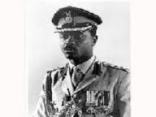JusticeGhana Military Personality today is General A.A. Afrifa
The OmanbaPa Research Group
General Akwasi Amankwa Afrifa, together with General I.K Acheampong and General Federick William Kwasi Akuffo, alongside five senior military officers: Amedume, Boakye, Felli, Kotei and Utuka, were executed by firing squad on 26 June 1979, after the 4 June Uprising, that was staged by the then Captain Kojo Boakye Djan. This ushered in the Armed Forces Revolutionary Council (AFRC), to be headed by one Flt-Lt J.J. Rawlings.
Born on 24 April 1936, in Asante Mampong, in Asante Region, the young Akwasi began his elementary education at Presbyterian Boys Boarding School, Mampong. Between 1952 and 1957, Akwasi was at Adisadel College, Cape Coast, where he obtained his secondary education. He was enlisted into the Ghana Armed Forces in 1958 and had his officers’ cadet training in Ghana and later at Mons Officers Cadet School, Sandhurst (1958-1960), in UK.
In 1960, Akwasi Amankwa Afrifa was commissioned as second lieutenant in the Ghana Armed Forces and served as General Staff Officer in the army from 1962 up to 1964. He also attended the Defence College, at Teshie in Accra. He is said to be one of the outstanding soldiers sent to serve with the United Nations peace operation in the Lumumbas Congo.
By 1965 Afrifa was staff officer in charge of army training and operations, in Kumase, which served as the headquarters of the Second Infantry Brigade (the HQ of the Northern Command). Military historians have it that it was this enviable position at the training school that motivated and probably imbued him with the courage and certainty of overthrowing the leadership of the Osagyefo Dr Kwame Nkrumah and his then one party state of Ghana.
Afrifa eventually came to military and political limelight on 24 February 1966 where together with Lieutenant-Colonel Kotoka, led a joint southern-northern military exercise codenamed: “Operation Cold Chop”- a military exercise that out staged Nkrumah-led Convention Convention People’s Party while the Osagyefo was on peace mission in far away Vietnam.
But legend has it that President Nkrumah persuaded young Afrifa to join the army. This was upon the impression he formed about Afrifa when he once visited Adisco. Professor Adu Boahen has this to write about the 1966 coup: “…Shortly before 6.00am on that day a strange voice, later identified as that of Major A.A. Afrifa, asked Radio Ghana’s listeners to stay by their radios for an important announcement. Later, Col. E.K. Kotoka burst on air with:
Fellow Ghanaians, I have come to inform you that the Military, in co-operation with the Ghana Police, have taken over the government of Ghana today. The myth surrounding Nkrumah has been broken. Parliament is dissolved and Kwame Nkrumah is dismissed from office. All Ministers are also dismissed. The Convention People’s Party is disbanded with effect from now. It will be illegal for any person to belong to it. We appeal to you to be calm and co-operative. All persons in detention will be released in due course. Please stay by your radios and await further details.” That marks the beginning of Afrifa’s political bid in Ghana.
By 1969, following the resignation of General Ankara as head of state and Chairman of National Liberation Council (NLC), had been installed head of state of Ghana and leader of that military junta that he was a main character. He became the Chairman of the Presidential Commission between 1969 and 1970 when the second republican rule was restored and bestowed on ‘opposition leader’ Dr K.A. Busia-led Progress Party on 03 September 1969.
General AKwasi Amankwa- known by his admirers as Okatakyie retired from the army and embarked on farming at his home village in Krobo, near Asante Mampong, in Sekyere West District. Yet, his continued passion for politics never waned. He championed the cause of Popular Movement for Freedom and Justice that thwarted the aspirations of General I.K. Acheampong’s Union Government project which sought to establish one party state.
It came as no surprise when in 1978, the Kutu-led National Redemption Council (NRC) that toppled the PP government that he helped installed in 1969, had no option but to arrest and detain him.
Yet, that was not the political end-tunnel of the Okatakyie who is speculated to have warned Kwesi Akufo-led Supreme Military Council about the dangers that JJ Rawlings and his 15 May mutineers, posed to their collective security. Until his death, the Okatakyie was a staunch member of Paa Willie-led United National Convention (UNC) and the Abakomahene of Krobo.
The former head of state was elected Member of Parliament in 1979 but failed to take up his seat at the Third Republican Parliament. He was untimely executed at the prime age of 43 together with two other former heads of state- Acheampong and Akuffo whom he had earlier cautioned about the future.
………………………………………………

